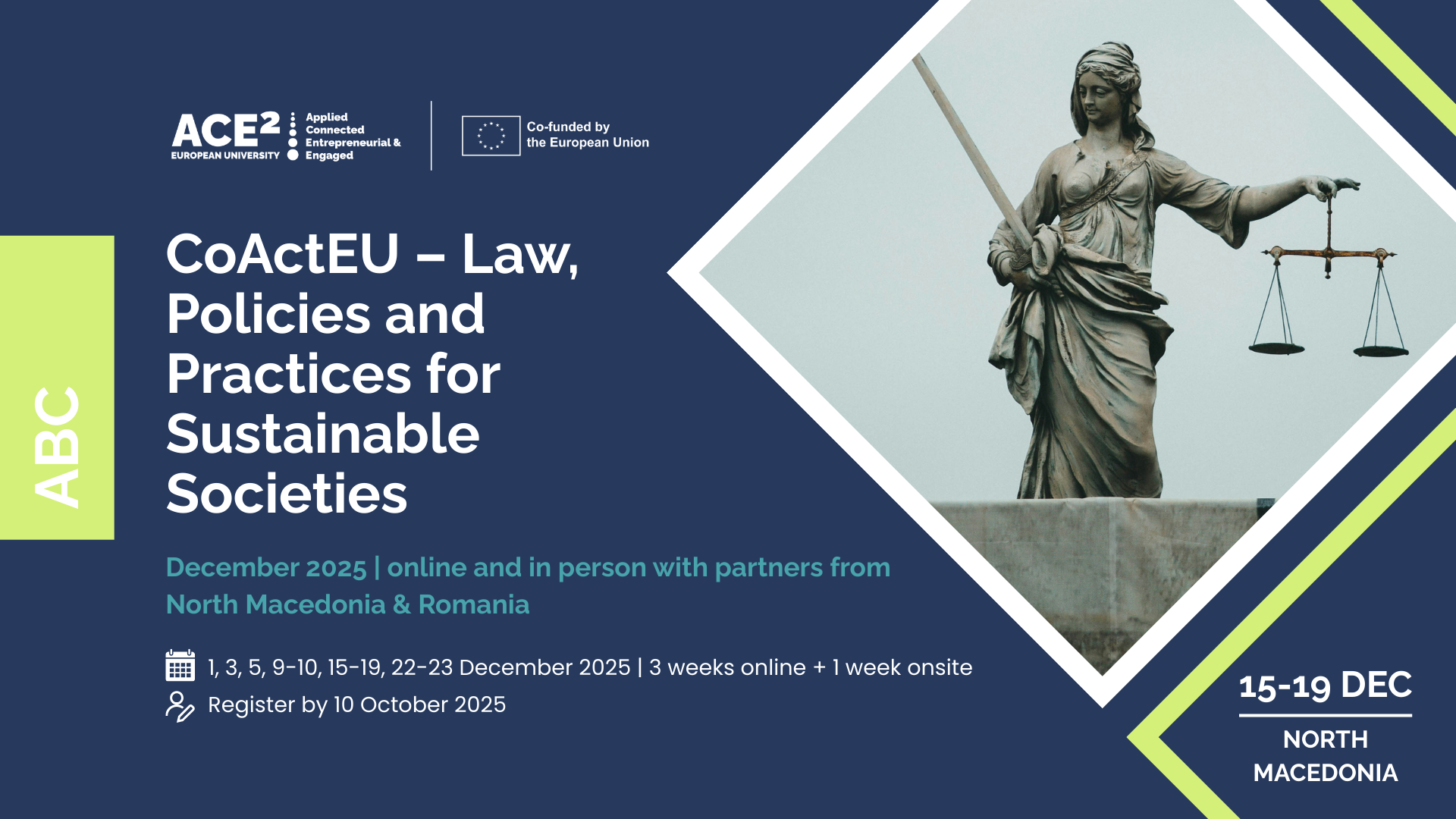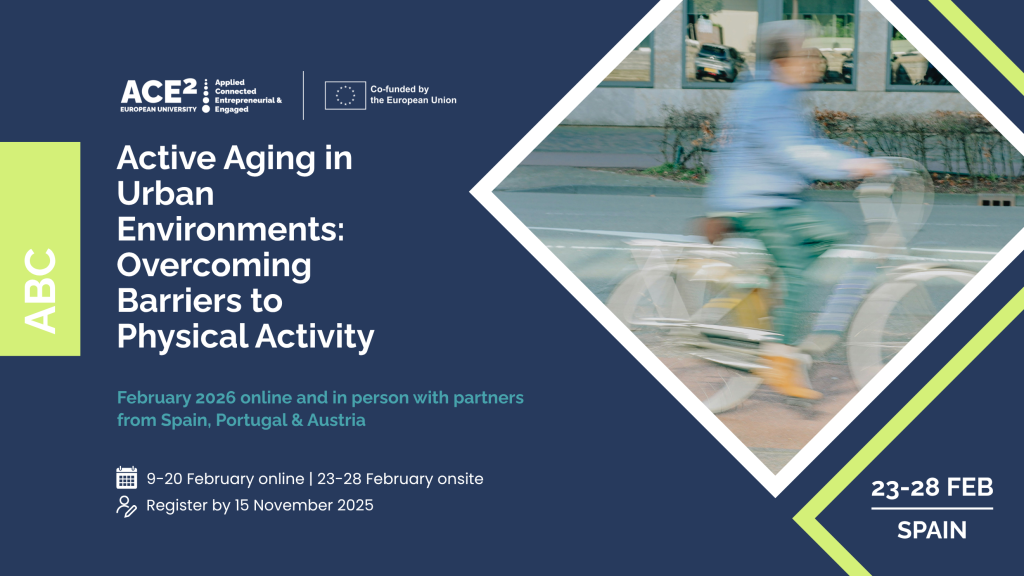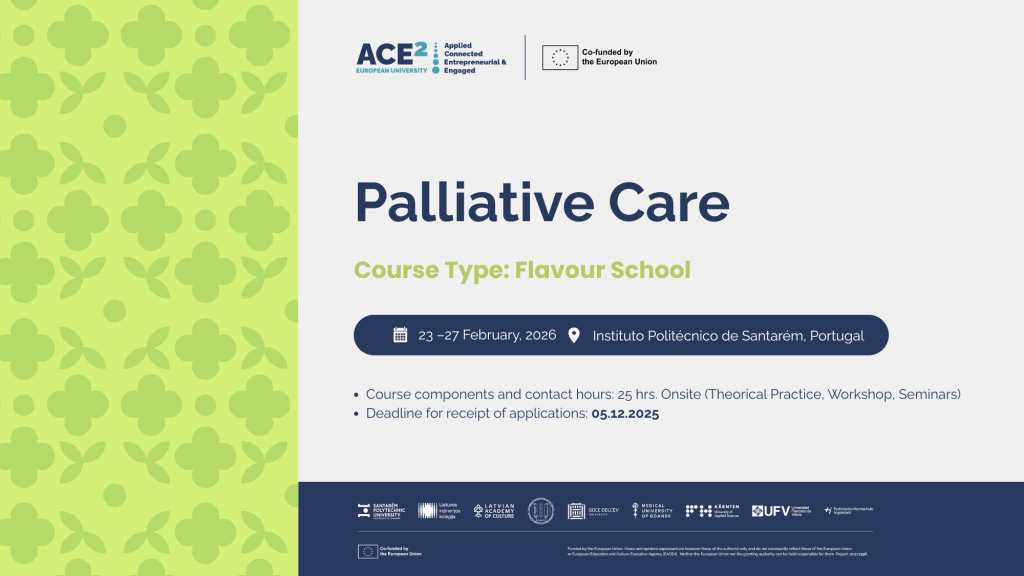
- This event has passed.
CoActEU – Law, Policies and Practices for Sustainable Societies

Course Type: Applied Blended Challenge (ABC) Programme
These are blended credit-bearing programmes which use a challenge-based pedagogical approach will involve a minimum of one mobility week for participating students and will be open to students from all ACE2-EU Aalliance members. The main aim of ABCs is to allow students to work collectively on developing work plans and solutions focussed on solving real-world challenges identified by external stakeholders relevant to EU priority areas, through a blended challenge- based pedagogical approach.
Duration and Timeline:
- Course components and contact hours: 20 hrs synchronous online, 25 hrs onsite + 45 hrs independent and group work
- Online component: 1, 3, 5 December 2025, 10:12 CEST ; 9 – 10 December 2025, 10:12 CEST, 22 – 23 December 2025, 10:12 CEST.
- On-site component: 15 – 19 December 2025 (Goce Delcev University (UGD)– North Macedonia).
Award, Credits and Certification
On sucessful completion of the course participants will receive 3 ECTS credits and a certificate of attendance
Organised by:
Goce Delcev University (UGD)– North Macedonia
- Ana Nikodinovska Krstevska
- Biljana Todorova
- Borka Tusevska Gavrilovikj
University Constantin Brâncusi (UCB) – Romania
- Luminița Georgeta Popescu
- Corina Drăgan
- Adriana Comarlă
External stakeholders that will be involved in the course:
Municipality of Stip, Republic of North Macedonia
Course Description and Learning Objectives
CoActEU – Law, Policies and Practices for Sustainable Societies
is a 4-week Applied Blended Challenge (ABC) programme that combines online and face-to-face learning. Designed for students from diverse disciplines, the course introduces the EU’s approach to sustainability and empowers youth to act as agents of change in their communities.
Working in international and interdisciplinary teams, students will explore EU sustainability law and policies, identify local challenges, and co-design innovative solutions in collaboration with universities, local stakeholders, and civil society. The programme culminates in the design and presentation of community-based project proposals that translate European sustainability strategies into practical local action.
Course Description:
The course is designed to introduce, deepen, and broaden students’ understanding of sustainability as a multidimensional concept, with particular emphasis on the policies, legal frameworks, and practices that underpin the development of sustainable societies. The entire course is delivered through online sessions, on-site session and reflection session,
Online sessions: The online component of the course provides students with a foundational understanding of sustainability in the European context, combining theoretical knowledge with practical application. During these sessions, students will:
- Familiarise themselves with European sustainable development Onsite sessions: The policies, exploring key strategies and frameworks that guide sustainability efforts across the EU.
- Examine EU law and institutions, with a focus on how sustainability policies are formulated, implemented, and monitored at different levels.
- Engage in discussions with experts and academics to analyse legal, political, and institutional challenges related to sustainability.
- Collaborate in teams to develop initial project ideas, applying their acquired knowledge to propose practical solutions for local sustainability challenges.
The online sessions lay the groundwork for subsequent onsite activities, ensuring students are prepared to engage with local stakeholders and apply theoretical concepts in practical, community-based projects.
Onsite component of the course provides students with hands-on, experiential learning opportunities that complement the theoretical knowledge gained online. During these sessions, students will:
- Participate in theoretical modules delivered through a structured, methodology-driven approach.
- Complete practical assignments designed to apply sustainability concepts in real-world contexts.
- Visit workshops, laboratories, and relevant institutions, gaining direct exposure to sustainability practices.
- Engage in knowledge and experience exchanges with practitioners and key stakeholders, fostering professional insight and collaborative skills.
Through these activities, students will develop a deeper understanding of sustainability as both a lifestyle and a guiding principle, preparing them to contribute effectively to creating more sustainable and livable communities.
Follow-up / reflection: The follow-up component of the course is designed to consolidate and apply the knowledge and skills acquired during the online and onsite sessions. During these sessions, students will:
- Practice and apply acquired knowledge by engaging with real-life cases, practical examples, and concrete sustainability challenges.
- Disseminate knowledge through workshops, project presentations, and analyses of regulations, legislation, and best practices.
- Receive mentoring and guidance to finalise their project proposals, ensuring academic rigor and practical feasibility.
- Share results online with the broader European network of partners, fostering cross-cultural collaboration and exchange.
- Conduct reflection and evaluation to assess what strategies and solutions work best and how they can be adapted or scaled further.
- Prepare for potential funding applications or local initiatives, translating project ideas into actionable community interventions.
These sessions aim to ensure that students not only internalise theoretical knowledge but also gain practical experience in implementing sustainable solutions, reinforcing their ability to contribute effectively to sustainable societies.
Specific learning objectives include:
Participants will:
- Identify and critically analyse sustainability challenges in their communities and disciplines.
- Collaborate with peers from diverse academic backgrounds and with local stakeholders.
- Co-design impactful, community-oriented projects that connect EU policies with local practice.
- Develop key transversal skills:
- Critical thinking & problem-solving
- Communication & advocacy
- Creativity & innovation
- Project planning & leadership
- Intercultural awareness & teamwork
- Reflect on their personal and professional growth as collective change-makers in sustainable societies.
By the end of the course, students will be able to:
- By participating in the CoActEU – Law, Policies and Practices for Sustainable Societies, studens will gain a powerful combination of skills, experiences, and opportunities that go beyond the classroom:
- Understand and analyse sustainability as a multidimensional concept, including environmental, social, and economic dimensions.
- Explain European Union sustainability policies and strategies, and critically assess their formulation, implementation, and impact.
- Evaluate relevant legal frameworks and institutional structures that govern sustainable development at European and local levels.
- Apply sustainability principles in practical contexts through project-based learning and real-life case studies.
- Collaborate effectively with peers, stakeholders, and practitioners to co-design innovative solutions for local sustainability challenges.
- Communicate project proposals and findings clearly and persuasively, both in written and oral formats.
- Reflect critically on sustainability practices, identifying effective strategies and potential improvements.
- Develop skills for planning, implementing, and monitoring community-based sustainability initiatives, including understanding potential funding mechanisms.
- Demonstrate ethical and responsible decision-making that considers social, environmental, and economic implications of actions.
- Integrate theoretical knowledge with practical experience, preparing to contribute to sustainable societies as informed citizens and professionals.
Which students would find this course useful for them?
This course may be suitable for students from ACE2-EU partner universities enrolled in undergraduate or postgraduate programmes in the following fields:
- Law
- Political science
- Envrinmental studies
- Economics
- Sociology
- Applied science and practices
- Ethics/Philosophy
- Education
- EU and International polocies and law
- Urban and regional planning
- Other academic areas also contribute to the understanding and development of the sustainability concept, particularly in relation to policy-making, legislation, and practical implementation.
This course may be suitable for those who have an interest in:
- Understanding sustainability as a multidimensional concept, including its social, economic, and environmental aspects
- European Union policies, law, and governance related to sustainable development
- Designing, implementing, and evaluating practical sustainability projects at the local or community level
- Engaging with legal, political, and institutional frameworks that shape sustainable societies
- Collaborating with peers, stakeholders, and practitioners to co-create innovative solutions
- Ethical decision-making and responsible citizenship in the context of sustainability
- Developing professional skills in project management, policy analysis, and knowledge dissemination
Recommended Language Level :
- Basic to intermediate level of English (B1 – B2), as the working language will be English
Application Process:
Interested applicants should
🔗 Apply here: https://forms.gle/aZdLzShYX8ywqRpK7
Deadline for receipt of applications: Friday, 10 October 2025 before 23:59
A notification of acceptance to participate will be sent to sucessful applicants on the day of month year (an acceptance letter will be sent by the host institution and will include programme registration details)
Further Information
For any further information or queries related to the course, please contact: ace-com@e-ucb.ro



